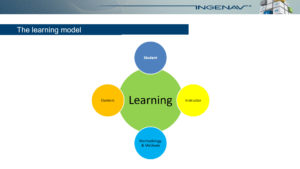A few years ago, I was contacted by an ATC academy with a request to help them with a number of objectives which included:
- forging a stronger instructor´ team,
- go beyond the minimum knowledge required (usually the instructor endorsement and classroom instructions techniques) and
- to reflect on best-fit training delivery methods.
I then set out to create a workshop with these objectives in mind.
Now, we are fours years down the line, with eight of such workshops delivered to four European ATC schools. Five further workshops are already planned for between the end of this year and 2021.
The workshops are a mixture of facilitated sessions and presentations in which we go through a simple, but effective, model that says that to consider learning we need to consider 4 areas: Who, What, How and By Whom.

The who is the student, who has a need to learn, the What is the subject matter – or content, the How is the methodology and methods used and the By Whom is, of course, us the instructors/teachers/coaches.
We go through a reflective path to consider all these elements as the basic ingredients that make up a plate. One can say that there are as many learning experiences as there are plates and the trick is to dose the basic ingredients right. However, as anyone who has attempted a little bit of cooking knows, before dosing an ingredient, one needs to know what it tastes like and what effect it´s presence (or absence) and quantity will produce in the plate.
The results help those attending, who range from instructors to training managers and those responsible for training development to reflect about the fit of the learning experience to the ingredients they have: the type of students and the subject matter. It helps them think on whether adjustments to the methodology and methods are necessary and finally to determine their own needs to be an integral part of the recipe.
The feedback received is very positive. We step down the hamster wheel called routine (no wonder that in many languages routine (from road) and wheel are related) and start reflecting on what is working and what can be improved. We come out of the workshop with insight into our work and our needs as instructors. We also come out with concrete ideas on how and where to make adjustments.
This year brought a new challenge: These workshops were until now held in a face to face set up with a lot of team exercises and dynamics. With restrictions in meeting and in travelling, we had to take a decision to either postpone the planned workshops, and lose good time when actually reflection and change COULD take place, or find another solution. We decided to go online. We had to consider the number of participants and also most of the exercises and the dynamics in which they are done. The first such workshop took place a week ago with very good results!
As for me, each workshop is a learning experience. I do provide my ideas through the presentations and also challenge the status quo. I also learn a lot, from the day to day examples, from the insight that my fellow instructors provide and also come out energised ready to do more to improve the learning experience in our business!